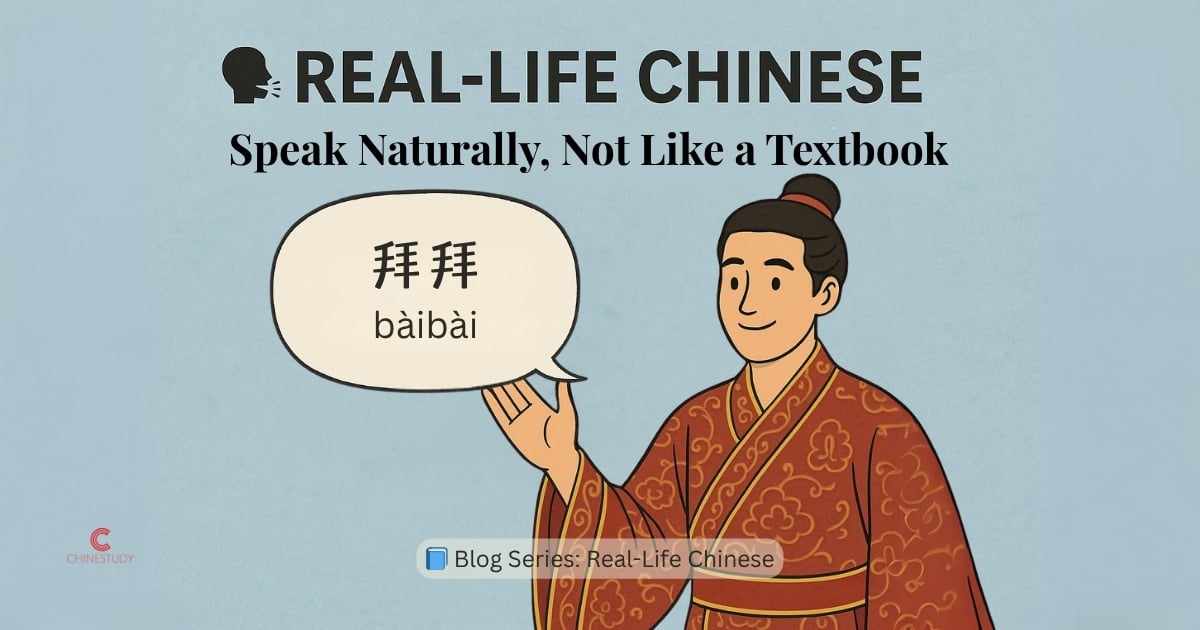How Chinese People Really Say Goodbye — Not Just “再见”

Say goodbye the way native speakers really do.
📕 Textbook Chinese
再见。 (Zàijiàn.)
“Goodbye.”
This is one of the first phrases learners are taught.
But in real life, Chinese speakers don’t say it often.
“再见” is polite — but in real life, it often sounds formal and distant.
✅ Real Chinese
Try these instead:
- 拜拜 (bàibài) = Bye-bye (super common and casual)
- 回见 (huí jiàn) = See you later
- 走了 (zǒu le) = I’m off / I’m leaving
They’re casual, friendly, and sound much more natural.
💡When to Use Them
These are perfect for:
- Leaving a friend’s house
- Ending a chat with classmates
- Walking away from a group at school or work
- Wrapping up a phone or video call
If you want to sound natural and not like a textbook, use these instead of 再见 (zàijiàn).
🧱 Example Sentences
1.
A: 好了,我先走了!
(Hǎo le, wǒ xiān zǒu le!)
Alright, I’m heading off now!
👉 拜拜! (Bàibài!)
Bye-bye!
2.
A: 我明天还来。
(Wǒ míngtiān hái lái.)
I’ll come again tomorrow.
👉 回见! (Huí jiàn!)
See you again!
3.
A:你们慢聊,我走了!
(Nǐmen màn liáo, wǒ zǒu le!)
You all keep chatting, I’m off!
👉 好的,拜拜~ (Hǎo de, bàibài~)
Alright, bye-bye!
🤓 Why It Sounds Better
- These phrases are what locals actually say
- They feel casual, relaxed, and friendly
- They help you sound more fluent and less robotic
⚠️ Common Mistake
🚫 Saying “再见 (zàijiàn)” to friends or classmates every time.
It’s not wrong, but it often sounds stiff or distant.
You’ll rarely hear native speakers use it in casual conversations.
✅ Try these instead:
- 拜拜 (bàibài) – universal and light
- 回见 (huí jiàn) – polite and warm
- 走了 (zǒu le) – casual and confident
🏆 Quick Practice
Your friend says:
“我要走啦!”
(Wǒ yào zǒu la!)
I’m leaving now!
What would you say?
A. 再见。(Zàijiàn.)
B. 拜拜!(Bàibài!)
✅ Correct Answer: B
It’s friendly, real, and sounds just right.
✨ Final Thoughts
Ditch the textbook “再见 (zàijiàn)” in daily life.
Next time, try one of these:
💬 拜拜! (bàibài)
💬 回见! (huí jiàn)
💬 走了! (zǒu le)
You’ll sound more like a native in no time.
📘 Want more like this? Check out the full blog series: Real-Life Chinese
Thank you for subscribing!
Have a great day!